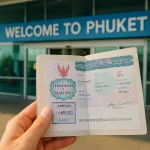Working in Thailand: Is it truly possible, and what must you endure to make it work?
Thinking of working in Thailand but not sure if it’s worth the hassle? Wondering whether a work permit is just a paper formality or a bureaucratic Everest? Picturing sunny beaches but fearing visa runs, stingy salaries, and government red tape? You’re not alone.
Let’s unpack the real deal about working in Thailand like we’re chatting over Thai iced coffee in Rawai.
Can foreigners actually work in Thailand?
Yes, but not without jumping through some legal hoops.
To work in Thailand, you’ll need two essentials:
- A Non-Immigrant B Visa (applied before entering Thailand)
- A Work Permit issued by the Thai Ministry of Labour
Even unpaid volunteer work counts as work. You’ll need the same documents. No shortcuts, no “I’ll just help at a hostel” hacks. Thai law defines work broadly, covering mental and physical activities, paid or unpaid.
The big watch-out? Don’t land in Bangkok on a tourist visa and expect to wing it. Overstaying or working without permits can lead to fines, blacklisting, and detention.
What kind of jobs can you do legally?
You can teach English, run a business, or work in tourism, IT, or international trade.
But the Alien Employment Act is strict. Foreigners are banned from many roles, like:
- Manual labour
- Front shop sales
- Accountancy
- Driving
- Hairdressing
- Wood carving
- Tour guiding (yes, seriously)
Stick to jobs that aren’t on the restricted list. Safe options?
- TEFL English teaching
- Digital nomad work (with the new Destination Thailand Visa)
- Hospitality (management, not waitressing)
- IT or consulting roles
Where are the best places to work in Thailand?
Most expats end up in:
- Bangkok: Think of it like London but hotter and spicier. Fast-paced, sprawling, and filled with startups and international schools.
- Chiang Mai: The chilled-out, mountain-backed creative hub. Digital nomads love it here.
- Phuket or Koh Samui: Tourism-driven, beachy, but with fewer long-term contracts.
You’ll also find teaching jobs in smaller towns, especially in state schools hungry for English teachers.
Check our guide on healthcare: Best Hospitals in Phuket
How much will you earn working in Thailand?
Salaries aren’t sky-high, but neither is the cost of living.
Here’s what to expect:
- TEFL teacher: THB 30,000 to 100,000/month depending on experience and location
- Hotel management: THB 50,000 to 150,000/month in tourist hotspots
- Remote IT/marketing work: Whatever you negotiate with foreign clients
Your employer must also provide:
- Health insurance (public or private)
- Social security contributions
- At least 6 days’ annual leave and 13 public holidays
- Sick, maternity, and paternity leave
Some hospitality gigs offer free accommodation and meals, especially in resort towns. Digital nomads cover their own costs.
Do you need to speak Thai to work in Thailand?
Not necessarily.
- TEFL teachers must use only English in the classroom.
- Hospitality roles in tourist areas rely on English and Mandarin.
- Remote workers can live here without knowing more than “Sawasdee.”
But speaking Thai opens doors, deepens friendships, and saves you cash when negotiating rent or shopping local.
What visa do you need to work legally in Thailand?
For paid work:
- Get a Non-Immigrant B Visa (before arriving)
- Use that to apply for a Work Permit from the Department of Employment
For digital nomads:
- Apply for the Destination Thailand Visa (DTV)
- Valid for 180 days/year for 5 years
- Requires THB 500,000 in savings
For volunteering:
- You’ll need a Volunteer Visa + Work Permit
Don’t try to hack the system with visa runs. Thai immigration is strict. Stay legal.
How hard is it to get a work permit in Thailand?
It depends on your employer.
They must:
- Be a registered Thai company
- Hire at least 4 Thai staff per foreign worker
- Show paid-up capital of THB 2 million per foreign hire
You must:
- Have the correct visa
- Pass a medical check (no serious communicable diseases)
- Show a clean criminal record
No work permit = no legal work. Period.
Can you start your own business in Thailand?
You can, but brace yourself.
To register a company as a foreigner:
- You need Thai shareholders (usually 51%) unless under the Foreign Business Act
- Must hire Thai employees
- Still need a work permit to draw salary
Or you can set up a BOI-promoted company, which offers tax benefits and fewer restrictions — but it’s not a walk in Lumpini Park.
What about digital nomads and freelancers?
This is where things get blurry.
Thailand doesn’t officially allow remote work on a tourist visa. But the new Destination Thailand Visa is designed for you.
To qualify:
- Be over 20 years old
- Have proof of savings (THB 500,000)
- Pay THB 10,000 for the visa
If you’re working online for foreign clients while sipping coconut smoothies in Pai – make sure you’re on the right visa.
Our guide on living on a budget in Phuket: Can you live in Phuket on $1,000?
Is the cost of living cheap enough to survive?
Mostly, yes.
In Bangkok:
- Studio apartment: THB 8,000 – 15,000/month
- Street food meals: THB 40
- Co-working space: THB 3,000/month
In Chiang Mai or Isaan:
- Rent can drop to THB 4,000/month
- Coffee is still strong and under THB 60
Western luxuries? They’ll cost you. Cheese, craft beer, imported clothes – not budget-friendly.
Check where to chill: Best cafes in Phuket
What’s it really like to work in Thailand?
It’s fun, frustrating, fascinating.
Expect slower bureaucracy. Be ready to wai everyone. Learn the rhythm. Watch your visa dates. Don’t argue with officials.
The locals are kind, curious, and deeply proud of their culture. Blend in, be respectful, and you’ll thrive.
You might work in flip flops. You might get paid late. But you’ll also eat pad kra pao for a dollar and bike past temples on your commute.Just make sure you’re working in Thailand legally, smartly, and joyfully.










